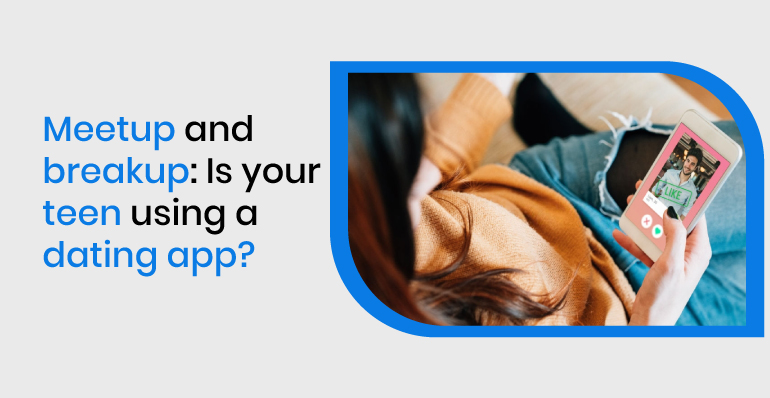Meetup And Breakup: Are Your Teens Using A Dating App?

Meetup And Breakup: Are Your Teens Using A Dating App?
Nowadays, teens are very addicted to phones and are familiar with using a dating app without knowing its consequences. Flirting, dating, and even “hooking up” have become much easier in the modern era and have become the new normal.
Adolescence is a time for romantic relationships to blossom. Every adolescent is experiencing a significant social change. However, with the emergence of social and digital media, these initial stirrings’ texture has changed.
 Online dating has its virtues — it makes approaching someone you’re interested in less daunting, particularly if you’re shy. You can customize your profile so that you never have to think about making a wrong first impression. And your pool of possible crushes isn’t limited to the handful of people you see every day at school, so you have a lot more choices.
Online dating has its virtues — it makes approaching someone you’re interested in less daunting, particularly if you’re shy. You can customize your profile so that you never have to think about making a wrong first impression. And your pool of possible crushes isn’t limited to the handful of people you see every day at school, so you have a lot more choices.
There are dating sites for every taste and need, including age, race, faith, and even hobbies and interests you want to share with potential partners. Not only that, but the atmosphere around online dating has shifted as well. It is no longer regarded as a last resort for the lonely and needy but rather as everybody does.
Their lives are intertwined with freely available resources, which are to blame for their approach to romantic relationships. So teens should be aware of dating apps and their consequences before falling too deep into these kinds of apps.
The Public Generally dislike Dating Apps
It isn’t easy to pinpoint the source of such feelings. However, there are two reasonable explanations:
There are inherent risks when looking for anyone online
It can be challenging to test characters online. You lose out on body language, tone of voice, and other characteristics that can help direct your instincts and protect you. Even if the other person is interested in dating, they can easily misinterpret themselves. Lying about anything from age, height, relationship status, and income are prevalent on dating sites.
Uncertain about the confidentiality of your details.
Some people are highly confident about providing information on a dating app, while some are not. Some think they protect their subscriber’s information and keep them confidential. So, there is a mass who blindly trust such apps, and some don’t.
Are dating apps more popular with teens?
Yes, Dating apps have gained more popularity among teens. Teens are always up to try something new and exciting. The dating app helps them meet new people, start relationships, easy hookups, and easy breakups. Following are the main fundamental reasons behind it:
- These apps offer instant gratification: There are no lengthy profiles to complete, and there is no need to wait to be matched with possible love interests. Teens, on the other hand, will begin searching for possible matches within minutes.
- These dating apps help avoid direct rejection: Users do not receive any form of notification when others swipe left, suggesting they are not involved. It makes dating apps seem less intimidating than asking someone out on a date in person for many teenagers.
Consequences Of Teen Dating Online
 People of all ages should exercise caution when meeting strangers online, and teenagers are particularly vulnerable. Teens may have a solid social media presence, but they are also vulnerable to risky actions. They don’t think about healthy online dating. They’re still not quite developmentally able to recognize red flags. So let us discuss more the dating app and their consequences in teens.
People of all ages should exercise caution when meeting strangers online, and teenagers are particularly vulnerable. Teens may have a solid social media presence, but they are also vulnerable to risky actions. They don’t think about healthy online dating. They’re still not quite developmentally able to recognize red flags. So let us discuss more the dating app and their consequences in teens.
Predators use Tinder to find teenagers
On dating sites like Tinder, teenagers are only expected to be able to communicate with other teenagers. People can, however, lie about their age. Predators love dating sites because it allows them to prey on underage teenagers.
Photos also show a teen’s exact location.
Dating sites and apps allow users to search for others within a mile radius, so they already know where they are. Strangers who are aware of the profile picture can also pinpoint a teen’s exact location.
Scammers use dating sites.
Fake profile pictures are often used to tempt unsuspecting individuals into talking. Scammers then collect personal information or provide shady links for teens to click on to trick them into giving out their information.
Meeting Peoples
Dating apps aren’t designed for platonic friendships. People who want to meet in person use it. Many teenagers underestimate the dangers of meeting strangers and would prefer to meet in a private setting.
Dating apps encourage sex.
You can find different apps for hookups and meetups. One-night stands are popular among dating app users. It is not a spot where young teenagers can meet up with their peers on the spur of the moment.
The idea of a dating app is shallow.
Dating apps allow users to make snap decisions about whether they want to know someone based on a profile picture.
Victim of online harassment.
The more your teen explores the world of romance online, the more likely they will encounter unwanted advances, sexually suggestive images, and general harassment through social media, which impacts their mental health.
Read More: How Online Monitoring Helps Your Teen Get Rid of Online Scams?
Dating App And Its Consequences In Teens And Rules To Follow
The consequences of dating app in teens are more vulnerable than you think. Parents should keep an eye on their children and keep them safe from dating online. If the teen gets into a dating app, they should follow some rules for safe dating.
Maintain the safety of identity
It may seem obvious, but scammers can be very imaginative and persuasive while attempting to steal your identity. Teach your children never to give their Social Security numbers, bank account details, or usernames and passwords to someone they meet online. Never send money to someone for any excuse, even if they say it’s an emergency.
Kids keep their full names, birthdates, addresses, and other personal details private before they believe they know and trust the people they are conversing with.
Use caution when using social media
Some of the most popular dating apps link to Facebook and show some of your public information to potential matches. Limit the amount of information exchanged by changing the privacy settings on your Facebook – and other popular social media – and making as little information available as possible.
If your children are concerned about getting a dating app connected to their Facebook account, they should try a different app that allows them to sign in without linking their accounts.
Before meeting in person, get to know your potential match
Young adults must make sure they aren’t being catfished before meeting up with someone they encountered on a dating app or blog. They should contact their online interest for a while before meeting up for a date, and if anything doesn’t feel right, they shouldn’t meet up with their online interest.
Video chatting is also an excellent way to ensure that the person they are speaking with is who they claim to be. If someone refuses to use Skype or FaceTime, they may be concealing something, even if they have a clever reason.
Conduct a Background Investigation
If young daters have friends in common with someone they met online, they may ask if the person is trustworthy. They can also use a search engine to reverse-search their photos on the app; if the search returns images linked to various social media accounts, the images were most likely stolen by someone else.
Safe Dates are recommended
Make sure the date occurs during daylight hours and in a public location – your children should not invite a date to your home, and they should not initially visit their dates’ homes. Kids should also notify friends and family of their whereabouts and always have an escape plan in place just in case.
They should also refuse rides from matches until they know and trust them, and they should always drive themselves and meet up at the venue. There is safety in numbers, so propose a double or group date.
Managing breakups in adolescent relationships
Teenage relationships are full of breakups and broken hearts. Adolescent breakups can be staged in public, such as at school or on social media makes the matter worse.
When a relationship ends, you should expect your child to be sad and emotional. While it might not seem so now, this is an essential aspect of learning how to deal with tough decisions and disappointments. Your child can need some time and space, also a shoulder to cry on, and open ears to listen. Your child can need some diversion as well.
Teens should have Faith in Friends and Family.
If you or your children’s friends advise against a match, your children should at the very least heed the advice. Many excluded from the scenario will have a more objective view and opinion of a potential date. At the same time, your children may be too excited to see any warning signs.
They should believe their instincts sometimes.
Something is probably not suitable if it doesn’t feel right. Your children are under no obligation to meet someone they meet on a dating app or website, even if matches are persistent or the other person gets offended if your children decline a date. I
f your child is approached on a date with which they are uncomfortable, they should suggest an alternative and be open about their concerns. Any rational and trustworthy individual can comprehend.
Final Thoughts
Young people can quickly put a stronger emotional bond with online-only relationships to the detriment of friends and family they meet in real life due to the online environment’s existence. Now, you know everything about dating apps and their consequences for teens.
You regularly check in with your teen to ensure that they maintain a healthy mix between online and offline activities and keep them safe online. You could also encourage your child to participate in sports, dance, and drama lessons. Or use parental controls to monitor online activities and other social events to engage with their peers offline.



 WhatsApp Spy
WhatsApp Spy Facebook & Messenger Spy
Facebook & Messenger Spy Viber Spy
Viber Spy Instagram Spy
Instagram Spy Skype Spy
Skype Spy TikTok Spy
TikTok Spy Telegram Spy
Telegram Spy LinkedIn Spy
LinkedIn Spy Twitter Spy
Twitter Spy Youtube Spy
Youtube Spy Photo Spy
Photo Spy Video Spy
Video Spy Calls and Contacts Tracking
Calls and Contacts Tracking SMS & IM Chats
SMS & IM Chats Voice Capture
Voice Capture Image Capture
Image Capture Video Record
Video Record